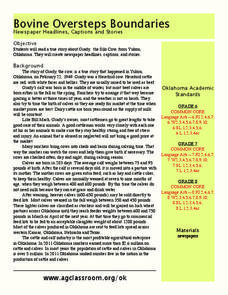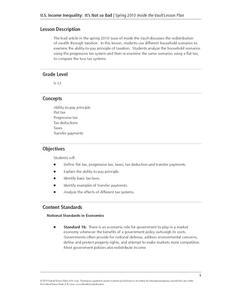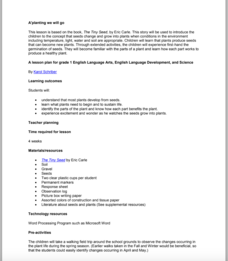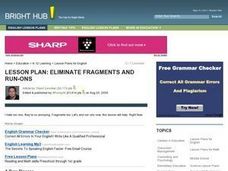Curated OER
Powerful Potato
Third graders make food. In this agriculture lesson, 3rd graders learn about the history of the potato. Students then plant potatoes, harvest them, and make french fries, potato salad or potato soup.
Curated OER
Rock, Paper, Scissors - Dominant and Recessive Traits from Parent to Offspring
Fifth graders understand the meaning of dominant and recessive. In this dominant and recessive traits lesson, 5th graders participate in a game and record results on a chart. Students relate experiment to genes. Students describe plants...
Curated OER
Utah Weather
Fourth graders diagram the weather in Utah through the use of a glyph. In this Utah weather lesson plan, 4th graders create weather glyphs of different areas in the state. Students answer questions about the weather and then compare...
Curated OER
What If?
Students examine the relationship between farmers and consumers. In this agriculture lesson, students explore supply and demand as they play an economics-based game.
Curated OER
Baa, Ram, Ewe....Sheep Tales
Students compare real and make believe animal behaviors by drawing and comparing them. In this real and make believe animals lesson plan, students compare the animal behaviors, express how colors create a mood in artwork, and investigate...
Curated OER
Cricket Wars
Students investigate crickets in their habitat. For this insect lesson, students create a cricket habitat by using a glass jar with grass clippings and cloth. Students observe how crickets interact with each other and their eating habits.
Curated OER
The Best Friend of Charleston, The Charleston Railroad
Third graders explore the Charleston Railroad. In this South Carolina history lesson, 3rd graders examine the impact of the rail line on economy and citizens of the state. Students create posters to advertising the railroad line that...
Curated OER
Flower Pot Salad Bar
Students discuss the connection between a flower pot and wholesome food by creating a salad. In this healthy eating instructional activity, students utilize numerous fresh vegetables to create a classic salad in a flower pot. Students...
Curated OER
Great Balls of Fire
Sixth graders compare and contrast natural and synthetic fabrics. In this science investigation lesson, 6th graders test the flammability of 6 natural and synthetic fabrics.
Curated OER
Food Safety
Students recognize that safe food preparation is important to good health. In this food safety instructional activity, students participate in an activity students separate, clean, chill, and cook food safely. Students use Glo Germ to...
Curated OER
Following The Sun
Learners investigate botany by conducting a plant growth experience. In this sunlight instructional activity, students utilize two potted flowers, depriving one of direct sunlight, and recording their growth process in science journals....
Curated OER
Bovine Oversteps Boundaries
Sixth graders read about Grady, the Silo Cow and analyze the parts of a news story. In this news article lesson, 6th graders discuss writing for different purposes. Students discover the characteristics of a strong headline. Students...
Curated OER
Waves Interference
Students identify different wave types and their characteristics. In this wave instructional activity students complete activities by activating tuning forks and interpreting data.
Federal Reserve Bank
U.S. Income Inequality: It's Not So Bad
What is the difference between a flat tax, progressive tax, tax deduction and transfer payments? Pupils examine the ability-to-pay principle of taxation through discussion, problem solving, and a variety of worksheets on topics from US...
Polar Trec
Nature's Density Column
Nature provides density columns in the polar regions that provides food for many animals. Young scientists build their own density columns with water in order to answer analysis questions. Through a slideshow presentation, scholars...
Curated OER
A'planting We will Go
Germination is an amazing process that results in amazing things. The book The Tiny Seed is the inspiration for a set of activities that will help build early literacy, observation, language, and writing skills. The class observes how...
National Wildlife Federation
Branching Out – Exploring Dendrochronology
Tree rings from North America give a continuous history of El Nino intensity over the last 1,100 years. Scholars learn how scientists use tree rings to create timelines demonstrating variations in weather patterns. The cumulative...
Poetry4kids
Evoking the Senses in a Poem
Budding poets choose a topic for a sensory-filled poem. Authors describe that topic using detailed language based on the five senses. Then, switch the senses to create a fanciful poem intended to add a touch of fun to the objective.
Roy Rosenzweig Center for History and New Media
American Indians and their Environment
People could take a page in ingenuity and survival from the Powhatans. Deer skins became clothes, and the members of the Native American group farmed the rich Virginia soil and hunted in its forests for food. Using images of artifacts...
Prestwick House
Teaching Shakespeare: Sonnet 73
It's that time of year to consider how Shakespeare selects his images and structures his Sonnet 73 to develop the meaning of the poem. Class members examine the rhyme scheme, the indented lines, the conceit, and the images used in each...
Curated OER
To Every Thing There is a Season......
A wonderful series of lessons on the four seasons. Everyone explores the seasons through looking at proper clothes, monitoring temperatures, looking at paintings of each of the seasons, and creating their own images with their...
Curated OER
Plants
Sixth graders examine how plants collect water and breathe. In groups, they participate in a variety of activities in which they discover how plants operate in terrariums. To end the lesson, they discuss why plants are important to the...
Curated OER
Leprechaun Dust
Learners make "leprechaun dust" in this short art lesson plan using Jello instant pistachio pudding, small jars, milk, and spoons. Ideal for celebrating St. Patrick's Day with early-elementary students. Can be combined with the reading...
Curated OER
Eliminate Fragments and Run-ons
Fix fragments and run-ons. Kids practice editing a piece of their own writing, read, and take notes of common examples. They practice connecting independent clauses and then use the information to edit previously written pieces. Note:...
Other popular searches
- Spring Art Lessons Primary
- Spring Lessons Kindergarten
- Science Spring Lessons
- Esl Lessons Science Spring
- Multicultural Spring Lessons
- Art Lessons Spring
- Art Spring Time Lessons

























